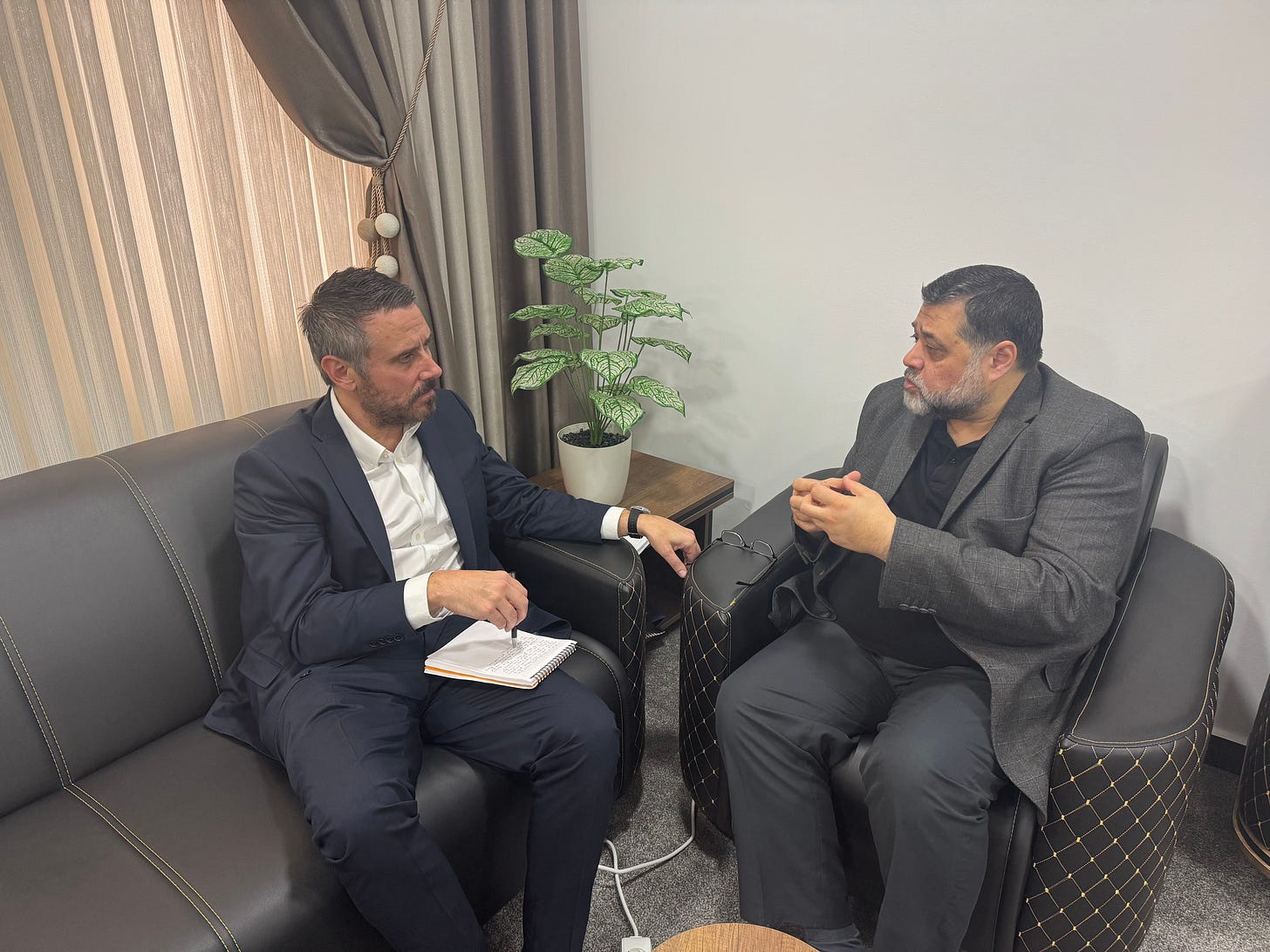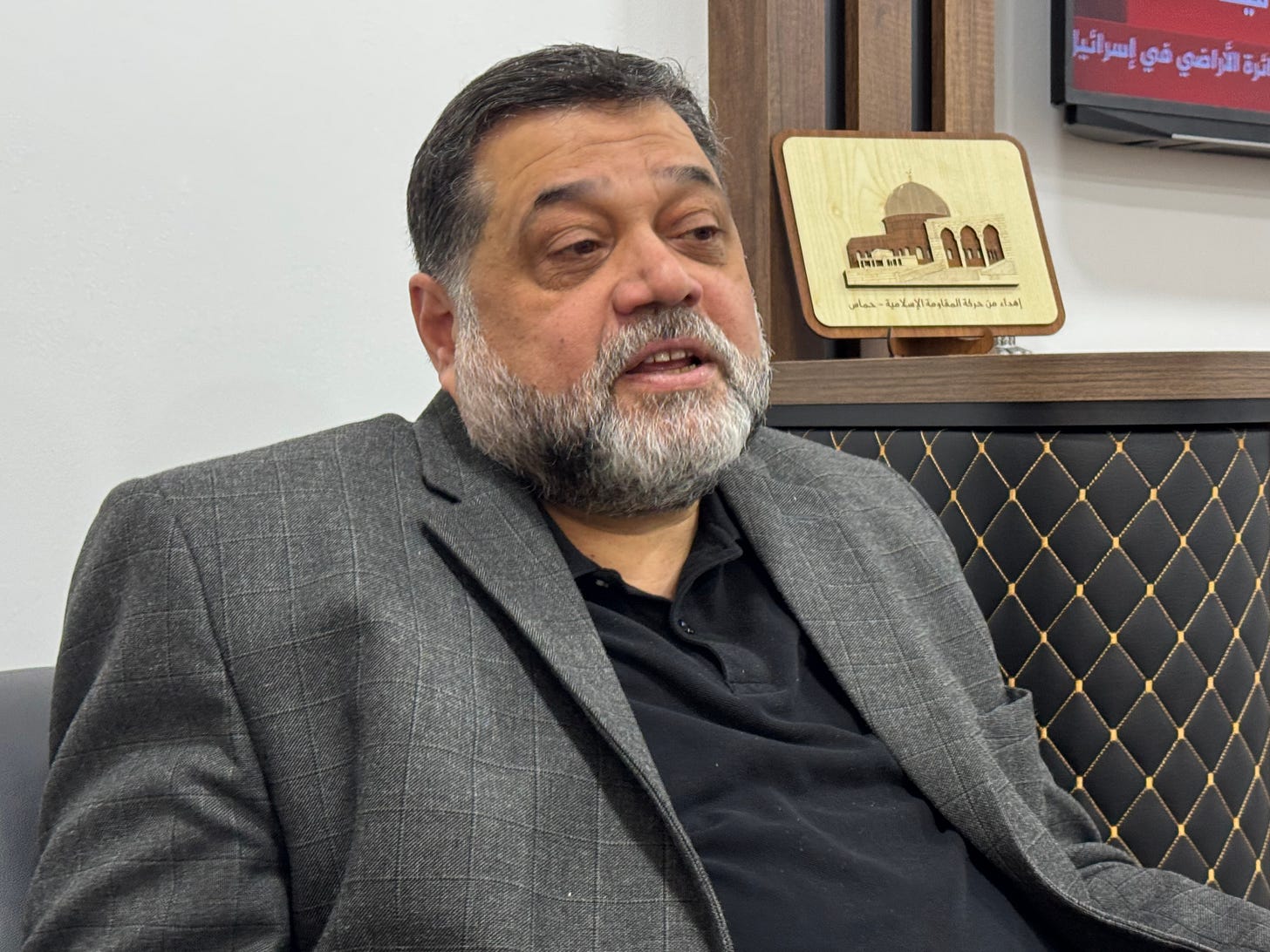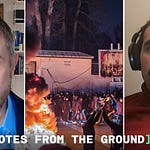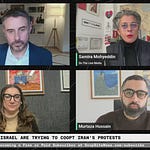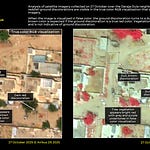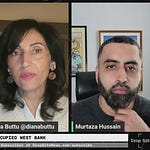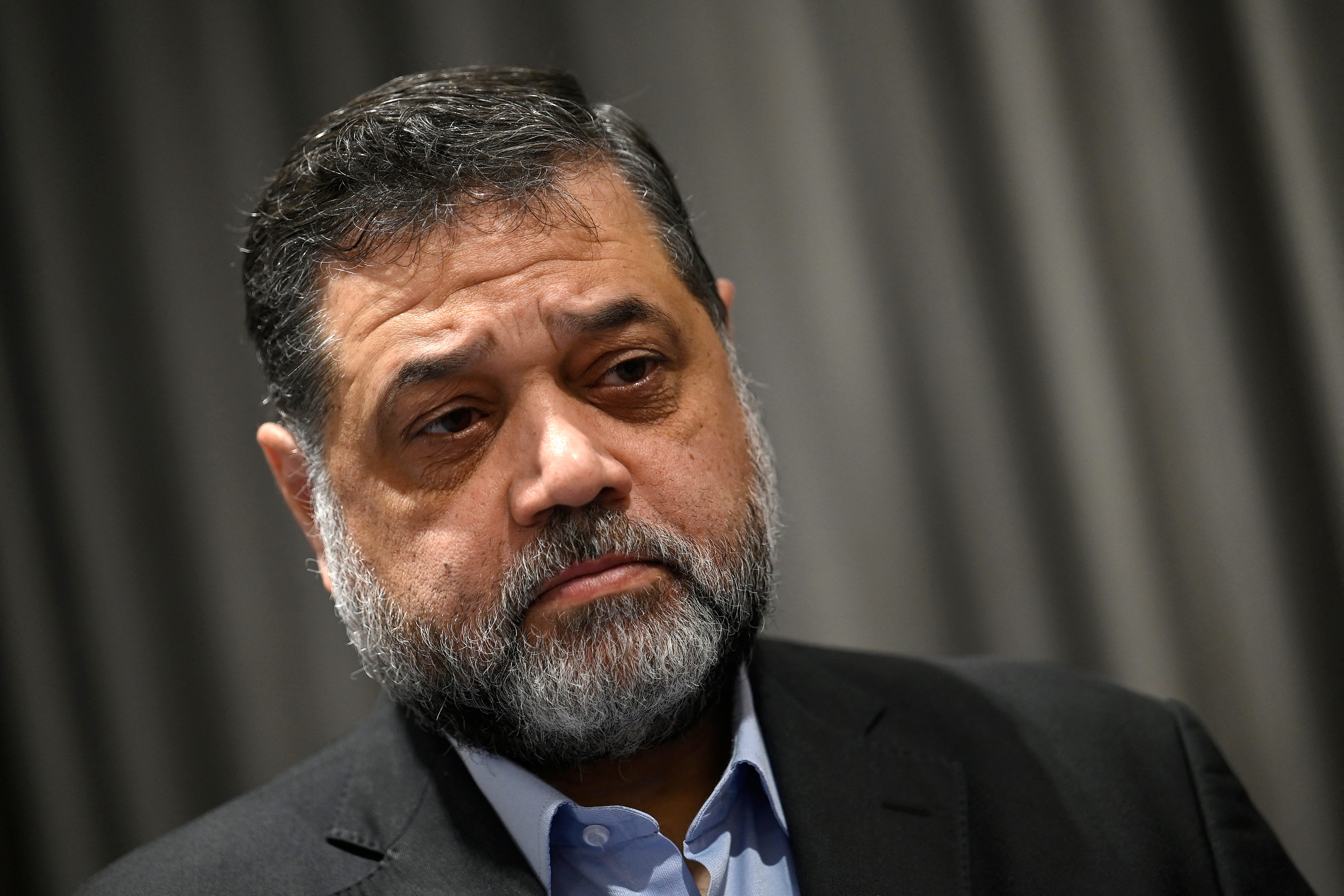
It has been 576 days since Israel initiated its genocidal war against the Palestinians of Gaza. The Gaza Strip, a territory roughly the size of Las Vegas, has been reduced to a moonscape of death and destruction with more than 90% of the population displaced multiple times. For more than two months, no food, water, medicine, supplies, fuel or anything has entered Gaza. That’s because Israel has imposed a full spectrum blockade as part of a stated policy to collectively punish the Palestinians of Gaza for Hamas’s insistence on reaching a negotiated end to the war rather than surrendering to the U.S.-backed Israeli army.
International fugitive and Israeli Prime Minister Benjamin Netanyahu vowed over the weekend to intensify Israeli attacks in the coming weeks and to expand the army’s ground operations inside Gaza. On Monday, Israel’s cabinet approved plans to capture the entire Gaza Strip and remain entrenched in Gaza indefinitely. The plan also calls for forcibly displacing Palestinians into small areas of the southern Gaza Strip. According to media reports, Israeli officials say the plan will unfold over the course of some months.
The Israeli regime has made clear to the world that it intends to carry out what Netanyahu has called “the final stage” of the genocide: the forced displacement of Palestinians from Gaza. Despite the fact that there are some 59 Israeli captives in Gaza—24 of them believed to be alive—Netanyahu has prioritized bombing displaced and starving Palestinian civilians in tents and burning women and children alive in their sleep over the return of his own citizens.
Israel’s threats to seize Gaza are clearly timed to coincide with U.S. President Donald Trump’s scheduled trip to the Middle East in a little over a week, where he will visit Saudi Arabia, Qatar and the United Arab Emirates.
Trump’s central agenda on this trip is not Gaza—he is looking to dramatically expand investment from these wealthy Gulf states and to sign major weapons deals and other agreements, particularly with the Saudis. Trump has been boasting that Mohammed bin Salman, the de facto ruler, has pledged to invest more than a trillion dollars in the U.S.
For its part, the kingdom has expressed concern that Trump will make public statements on his visit promoting his plan to broker a normalization agreement between the Saudis and Israel. Saudi officials in recent weeks have tried to get the Trump administration to commit to not raising the issue publicly, particularly after Trump told journalists in late April that he believed the Saudis would join the Abraham Accords. But Saudi Arabia has publicly stated that it will not do so unless there is a clear path to Palestinian statehood.
There are indications that Trump wants a pause in Israel’s scorched earth bombing of Gaza before meeting with Arab heads of state. But the January ceasefire deal, which the U.S., Egypt and Qatar guaranteed, was unilaterally blown up by Israel after just 42 days, first with the imposition of the blockade on Gaza and then, on March 18, when Israeli forces resumed a scorched earth bombing of the Strip that has killed more than 2,600 Palestinians, the majority of them women and children.
In late March, Hamas accepted an Egyptian bridge proposal that would have paved the way back to the original January ceasefire framework, which included terms that would see the exchange of all remaining Israeli captives in Gaza for a large number of Palestinians held by Israel, the complete withdrawal of Israeli forces, a long term ceasefire and the start of reconstruction in Gaza. Israel rejected that deal and said it would only agree to deals to free as many of its captives as possible without offering any guarantees about withdrawal or ending the war against Gaza.
Late last month, Drop Site obtained a draft of the latest proposal that Egyptian mediators presented to Hamas’s negotiators. It was entirely based on Israeli demands and appeared to completely eliminate the original January ceasefire terms. It called for total disarmament, not just of Hamas, but of the entire Gaza Strip. It also offered no clear terms for Israel to completely withdraw its forces and referred only to a process for discussing an eventual permanent ceasefire rather than linking it to the release of all captives. Hamas responded to this proposal by offering what it characterized as an “all for all” deal: the swift release of all Israeli captives as part of what is known in Arabic as a hudna, a long term truce that Hamas said could last between 5 to 7 years. Israel rejected the deal.
Donald Trump has said that he is pressuring Netanyahu to allow aid to enter Gaza, saying last week that he had told Netanyahu, “You got to be good to Gaza. Those people are suffering. There's a very big need for food and medicine, and we're taking care of it.” But this “taking care of it” reportedly involves Israel developing plans to further weaponize the delivery of aid by creating several so-called aid hubs that would be entirely controlled by Israel and private companies and would include political vetting to receive aid. International aid groups have refused to collaborate with Israel and 20 organizations signed a letter saying Israel’s plan would create “de facto internment conditions.”
Over the past 19 months, Western media outlets have done very little in depth reporting on the perspective of Hamas and other Palestinian resistance factions. These movements are often portrayed in a cartoonish manner as irrational terrorists who want to kill for the sake of killing. When they are interviewed by Western outlets, it is either to quote a sentence or two responding to allegations made by Israel or the U.S. or to relitigate the events of October 7.
We believe that this failure by Western media outlets to seek to understand the perspective of Hamas and other Palestinian groups is not just journalistic malpractice, but is a fundamental disservice to the public understanding of one of the bloodiest campaigns of annihilation against a people in modern history. A war of annihilation that is being funded, armed, and promoted by the U.S. and other Western powers. That is why we have made a commitment at Drop Site to interviewing leaders of Palestinian resistance movements and political parties.
Last week, I had the chance to travel to the region to conduct interviews, both on and off the record, with several leaders of Hamas and other Palestinian factions. In the coming days, I am going to be sharing some of what I heard in these discussions and we will also be publishing interviews with prominent resistance figures.
Today, we are going to hear from Osama Hamdan, one of the most prominent voices representing Hamas over the past 19 months. He is a chemist by training and has served in a variety of posts since he joined Hamas in 1992, a few years after the movement’s founding. He has served as Hamas’s representative in both Iran and Lebanon, as well as its chief of international relations. He was one of the top advisers to Hamas leader Ismail Haniyeh who was assassinated by Israel last summer in Tehran. After October 7, Hamdan became a regular fixture on Arabic language media because of his regular press briefings in Lebanon.
Osama Hamdan was one of two Hamas officials who led direct talks with Donald Trump’s special envoy on hostages Adam Boehler earlier this year. We had a wide-ranging discussion touching on the current state of the ceasefire talks and Hamas’s proposal for a long term truce. We also talked about why Hamas will not lay down its weapons or surrender, on the role of Arab governments during the genocide, as well as how Hamas views the Trump administration vs the Biden administration. We discuss the recent attacks launched against Hamas by Palestinian Authority president Mahmoud Abbas—last week he called Hamas “sons of dogs,” and demanded the group hand over its weapons and release all Israeli captives. Hamdan also analyzes Israel’s campaign to fully annex the West Bank and he offers Hamas’s current view of what is often referred to as a “two state solution.”
This interview with Hamdan is one of the most extensive English language discussions with a senior Hamas official conducted by a Western news outlet since the onset of Israel’s genocide in October 2023. And it offers a rare window into the group’s current thinking on some of the central issues now facing not only Gaza, but the broader cause for Palestinian liberation.
Interview with Senior Hamas Official Osama Hamdan
Jeremy Scahill: I'm sitting here with Doctor Osama Hamdan, who represents Hamas, and he has served in many positions over the years with Hamas and has been one of the most prominent people speaking for the movement since the genocide began in Gaza in October of 2023. Thank you so much Doctor Hamdan for taking the time to speak with me.
Osama Hamdan: Thank you. Thank you very much, Jeremy. Glad to talk to you.
Jeremy Scahill: So I want to begin by asking you about the current reality of the negotiation process. Israel is demanding only a short term deal where a large number of Israeli captives would be released, where a large number of Palestinians held by Israel would be released, but they are not willing to return to the original January ceasefire agreement that they signed with Hamas and that the US guaranteed, along with Qatar and Egypt. Hamas has proposed a long term truce that would also involve the release of all Israelis held in Gaza. What is the current status of these discussions?
Osama Hamdan: Well, as you have talked about that, in fact, on the 18th of March, the Israelis stopped the ceasefire and they went back to attack Gaza. We've talked to the mediators that they have guaranteed the ceasefire and they have to do their best to convince or to force the Israelis to keep going with the arrangement, which was agreed on the 17th of January. Unfortunately, the outcome was negative. So they came [back] with some ideas which convinced us that the Israelis are not willing to have a ceasefire. But we have an understanding that Netanyahu is willing to kill them [the remaining Israeli captives] rather than having them [freed] because, I think they have undermined—the [freed Israeli captives] who returned back to Israel—they undermined the narrative of Israel that those people were tortured, they were treated badly, et cetera.
Anyway, we've talked according to the latest with the mediators that we have two options. The first one is to go back to the arrangement, which was agreed on the 17th of January, and we are ready to continue in that process. If it's not possible, we can do it at one shot, a complete package: a ceasefire, permanent ceasefire with the prisoner exchange and also the Israeli troops would withdraw from Gaza and open the borders for the aid and the reconstruction of Gaza. And if you are asking, as mediators, about the choices of the ceasefire, we are ready to talk about a truce for a while, from five to seven years, which can deliver stability at least for a while for both sides. Unfortunately, until now we didn't receive any positive answer from the Israelis and we are still talking clearly that you can't go forward without a real ceasefire or real arrangements that can protect the Palestinians and give them, at least, the possibility and the chance to live in peace without being killed and assassinated by the Israelis in the genocide which have took place in the last 18 months.
Jeremy Scahill: The humanitarian situation in Gaza is totally catastrophic. The Israelis have imposed, for two months, a full spectrum blockade, no food, no medicine, not a grain of wheat has entered the Gaza Strip. Why is Hamas not willing to participate in a limited agreement of a truce of 45 days that would allow aid in, would get some Palestinians freed from Israeli prisons and jails and return some Israeli captives held by the resistance in Gaza? Explain the position of why Hamas says, “No, we won't do this.”
Osama Hamdan: Well, it's not only Hamas's position. We have heard that from most of the people, significant figures in the community.
Jeremy Scahill: You mean other resistance factions?
Osama Hamdan: Not only other resistance factions. The heads of the families, some people who are not from Hamas, journalists, academics, they are talking: if the choice is killing us gradually, it's not an option. So what the Israelis are offering is: We will give you a ceasefire for a short while and then we will come back to kill you again. So what's the idea of giving you food for 12, 40 days, two weeks or three weeks and then coming back to kill you? It means that you endorse the genocide and you accept that for your own people. So this is why we have said we are not interested in keeping the Israeli prisoners, who are not interesting as Palestinians, and just going to fight and coming back to be genocide. Why not go to the permanent ceasefire?
And I think our plan has exposed the Israeli position. They are not willing to have a ceasefire. They are not willing even to have peace with the Palestinians. They just concentrate on a simple idea: to kill all the Palestinians or to kick them out. They have talked about kicking the Palestinians out, not only from Gaza, even from the West Bank. So the idea for the Israelis now, they want to keep killing the Palestinians until one of the options: either to get rid of all the Palestinians because they are protected while they are committing this genocide. No one is talking about what they are doing. I know that there are free people all over the world, they are talking about that. But I'm talking about the political will in the international community. No one is doing anything to prevent them from doing that or to protect the Palestinians. So why not continue this? So the Palestinians have one of two choices, either to be killed or to leave their country, and [Israel] will then say, “well, they have left the country by their own choice.”
This is why we are concentrating on the idea of a ceasefire. We are not talking about not allowing the humanitarian aid to come. We are talking about stopping the genocide. This is the main issue. Going back to the issue of the aid, according to the international law, to the Geneva Accords, Israel cannot prevent the humanitarian aid or the medical aid to come in. They are breaking the law, they are breaking the Accords. They are not respecting even the international law. And they have to understand they [the state of Israel] were created by an international resolution. If they do not respect the international law, their presence as a state will be under question. Maybe not today, but after all it will happen, because if you do not respect the law which created Israel, you will not be respected as an existence according to this law, which was broken by your government and the army.
Jeremy Scahill: Is there any possibility—there have been some media reports, all of it based on anonymous sources—that there could be some delivery of aid, even outside of the context of any sort of an agreement with Israel? Do you think this is possible, that there will be a resumption of aid, even if there isn't any political negotiation that results in a short or long term agreement?
Osama Hamdan: Maybe the Israelis will do something like that, but not to protect the Palestinians from being killed by hunger. They may do such a thing as an effort to protect their position, because now they are under pressure from everywhere. “You are killing the Palestinians, you are committing a genocide. There is a hunger situation in Gaza. You are supposed to not allow this to happen.” So they may do something like what you have suggested in order to say, “Okay, we are sending some aid to the Palestinians, we are sending the food for the Palestinians, but they decide not to accept it,” or something like that.
I believe it's not the solution. If they want that, they have to open the border so everyone can send aid, the international community, the countries, the NGOs, even the United Nations. So they want to cover themselves by doing such a thing. And also they will—as we have learned all the time—they will use it for creating a propaganda that “we are acting according to the humanitarian basis, we are respecting the international law,” et cetera.
That brings us to a big question: Why are they not allowing the media to go in? Why are they killing the journalists? Because they are committing a genocide, they don't want anyone to see the facts or to learn those facts. In fact, they started the war, from the 7th of October, by lies, talking about beheaded children, talking about raped girls and women and after a while the people who created those ideas, they said in public that we were lying. But until now they are trying to use that. So why not use another issue, by sending a little amount of food for the Palestinians, which will not help them to survive for a long time and using that as a part of propaganda?
I believe the international community is supposed to go directly to Gaza and to focus on the real situation of the people in Gaza. It is worse than the Holocaust itself.
Jeremy Scahill: I want to ask you about this issue of disarmament, which has become a major focus of Israel and also in the media. The two big things: Hamas should leave the government of Gaza and Hamas should disarm. Before we talk about Hamas's position on disarmament, how did it become such an area of focus? Because this issue of disarmament was not mentioned in the January ceasefire agreement. So given that you're involved directly with all of this, I'm curious, how did you monitor this issue becoming such a major area of focus?
Osama Hamdan: Well, I want to have a sentence about Hamas leaving the government. Basically, Hamas believes that we have to establish a Palestinian democratic state and the Palestinian people have the right to elect their leadership. This is what we have talked about, not [just] today, not ten years before, [but] we have talked about that with Yasser Arafat in 1993. We suggested that why not have general elections for the PLO, the Palestinian National Council? And at that time he didn't say yes, but also he used an excuse that I may not be allowed to have those elections because the governments will not allow this to happen for the Palestinians who are in the diaspora. Anyway, that was the excuse. When we said that, it was a complete belief [on the part of Hamas] that you have to give your people their choice to elect their leadership.
This is why we participated in [the elections in] 2006. We won the elections and we took this kind of, I want to say the challenge, to form a government, and if the people elected someone else we would respect that. So when we are saying that we are not willing to keep the control in Gaza, it's because we believe the people have to elect their leadership. We will hand that to anyone who's capable to do that. And after a while we must go to a general election and the people have to make their choice, whether they elect Hamas or any other political party. And we will accept that, and we expect that everyone will accept that.
“That brings us to a big question: Why are they not allowing the media to go in? Why are they killing the journalists? Because they are committing a genocide, they don't want anyone to see the facts or to learn those facts.”
Jeremy Scahill: One follow-up on this issue, since you're focusing on it: Is it the official position of Hamas that it is willing to relinquish governance of Gaza?
Osama Hamdan: Well, we have said that we are ready for any option which can give the Palestinian people the chance to start the reconstruction of Gaza. We have talked to Abu Mazen [the nickname of Palestinian Authority President Mahmoud Abbas] about forming a national unity government. We have talked about a technocratic government. And then there was a suggestion from the Egyptian side to have a committee of leaders, independent leaders, from Gaza, to take control in Gaza for a while and then we can go to general elections. We've said yes, because if they were nationalist and they are working for Gaza’s benefit and the people’s, why not have them? It's OK.
And in fact, we and the other organizations [Palestinian political parties and factions] have nominated around 40-45 names, who can be accepted by all the Palestinian organizations. And we are still waiting for the decision of Abu Mazen to pick out 15 of them to form this committee. And we are ready to handle the things to [assist] this committee, knowing that if that was one of the options which can help the Palestinians to get through this massacre and this genocide, well, it's part of our duty to do that.
Jeremy Scahill: On this issue of disarmament, the most recent document that we saw that was presented to the Hamas movement, says in very clear terms that there must be a discussion of the disarmament not just of Hamas, but a demilitarization of the entire Gaza Strip. Hamas has said not just that this is a red line, but that it's a million red lines. Explain the position.
Osama Hamdan: You know, I have to say this issue was not on the table of the negotiations all the last 10 months. Maybe the Israelis have talked about this issue, maybe, I don't know, I don't have information, with some of the mediators. One of the mediators, he suggested that we have to start thinking about that once, and he didn't talk about this any other time.
We've said clearly, we are a people under occupation. We are not fighting just because we like to fight or it's a good idea to fight others. We are not fighting the Israelis because, for example, they are Jewish people. We don't have a problem with the Jewish people. In fact, when they were deported from Europe, they came to our lands and they have lived among the Arabs and the Muslims as respected humans with their religion as Jewish people. The problem is that they are occupying the land now. They turned from being people with a specific religion, which is respected by the Muslims, they turned to be occupiers and they are using their religion to legitimize that occupation, which is not accepted. Even if a Muslim came to occupy my land, I will fight him. It is not related to the religion. It is related to being an occupier or not an occupier.
So we as Palestinians have resisted the occupation, not [just] today. Hamas did not invent the resistance for Palestine. In fact, the Palestinians resisted the British occupation and since then the Israeli occupation for decades. Talking about de-weaponizing the Palestinians, it will not solve the problem. The new generation will fight because you are oppressing the nation all the time. So there is no option for the Palestinians to get rid of this occupation without the resistance, no other option.
They have went to the politics. In fact, they've negotiated that in Oslo and there was agreement. The suggestion was the Palestinian state would be established five years later. It didn't happen after more than 30 years. So as a nation under the occupation, we have the right, according to the international law, according to all the laws, to resist the occupation. You can't talk about de-weaponizing the nation who is under occupation, while they are occupied by the most powerful army in the region. In fact, they are maybe the 4th, the 5th, the 6th army in the world by their arms. If you want to talk about de-weaponizing someone, you have to talk about de-weaponizing the occupation, not the Palestinians who are oppressed by the Israelis.
So we are fighting to be liberated from the occupation. If that can happen in a political way, well, this is good. We will accept that, if it happened in a peaceful way. We don't want to be killed. We don't like to kill others. But if it didn't happen in this way, we will fight to have it. And the experience of the Palestinians is saying that, whenever the Israelis felt that they have succeeded in de-weaponizing the Palestinians or defeating the Palestinians, the new generation starts the fight again against the Israelis. So this is the situation. We are fighting for a political outcome, which is a Palestinian, independent, sovereign state. If we went directly to this goal, that will save all the blood which can be spoiled.
This is why we are talking no talks about the de-weaponizing. Let's concentrate on the main problem, the occupation. Let's talk about liberating the Palestinians from the occupation. Let's talk about the Israeli withdrawal from the occupied Palestinian lands, letting the Palestinians establish their own independent, sovereign state. And this will be the start of creating confidence and stability after that. If this happened, it will be a very good idea. If it didn't happen, no one can give up his weapons while he's being killed, tortured, jailed, and the most, I think, biggest genocide in the humanitarian history ever.
Hamas’s vision for a long term truce with Israel
Jeremy Scahill: I want to ask you about Hamas's proposal for a long term truce, but just one follow up on the issue of disarmament. There have been suggestions in the media that Hamas would consider temporarily storing weapons, monitored by a third party. Is there any truth to that whatsoever?
Osama Hamdan: Well, no one suggested that directly as part of the arrangements. Maybe it was an idea said by someone, mostly in the media. But, I will go back to the same idea. Well, what about the Israeli weapons? Are they going to store their weapons too? What is the meaning of storing the weapons? Well, such an experience happened in Northern Ireland. But there was a real political arrangement, which was accepted by both sides.
If there was political arrangements, which can be accepted by the Palestinians, which—the bottom line of it is the creation of Palestinian, independent, sovereign state—well, we'll talk about the weapons in different way. If there was a Palestinian state, those weapons would be handed to the Palestinian government. Even the fighters, they will turn to be part of the army or the police of this government.
Jeremy Scahill: This also happened in South Africa when the armed forces of the ANC became a part of the modern military.
Osama Hamdan: Exactly. So you have to start from the right point. You can't suggest partial solutions, which may lead to more complications in the situation rather than solving the problem itself.
Jeremy Scahill: Why do you think Israel is pushing this issue of disarmament? Israel knows that if the Palestinians were to give up their weapons, that it would be over. That the cause of Palestinian liberation or for an independent Palestinian state would be dead, if the Palestinians gave up their weapons. So on a political level, why do you think Israel is pushing this so hard?
Osama Hamdan: I believe the Israelis. They don’t believe in any solution with the Palestinians. I have to go back to the slogan which was raised before the creation of Israel, a nobody land for people who have no land.
Jeremy Scahill: “A land without a people for a people without a land.”
Osama Hamdan: Exactly. So, they discovered, at least, that the international community understands it was a lie. There is a nation—in fact, at that time, it was one of the most developed nations in the region—and you are taking their lands by power. And I will turn you back to what [Bezalel] Smotrich said two years ago, the finance minister in Netanyahu’s government, well, the survival of Israel for the last 7 decades was because they have forced the Palestinians to get out of their lands or the lands. And if you want to survive another 70 years, we have to deport them from the West Bank and Gaza.
When they talk about disarming the Palestinians, it's their idea of killing the hope of the Palestinians to be liberated. And then if they want to push them out, they, the Palestinians, will have no way to defend themselves. If they want to kill them, they have no option. So, when they talk about disarming the Palestinians—not only Hamas, the Palestinians—it means that they want the Palestinians to surrender. And when you surrender, you have to accept the will of the occupier. And they will go to everywhere and say, “Well, they have surrendered, what do we have to do? They have accepted that.” This is why I believe not only Hamas, not only the resistance, even the Palestinians who accepted the peace process with the Israelis, will not accept the idea of surrendering to the Israelis.
“I believe the Israelis. They don’t believe in any solution with the Palestinians.”
Jeremy Scahill: You've put forward, Hamas has put forward, a counter proposal to the suggestions that there should be a short term truce agreement. Hamas's position has always been, since January, that it will respect the three phase agreement that was guaranteed by the United States, Qatar and Egypt. But in the face of new proposals that are coming from Israel, where it eliminates the January framework, Hamas has put forward its own proposal based on a concept known in Arabic as a hudna, a long term truce. Explain in detail what Hamas is offering right now.
Osama Hamdan: Well, when we have received some silly ideas after the Israelis have attacked Gaza on the 18th of March, we've said, “You, as mediators, we are standing to talk about two options.” The first option is to go back to the arrangement, the three phase arrangement, and we are still ready to go forward with that. If not— and you want to talk about something else—we are ready to talk about a complete package. We want a ceasefire and Israeli withdrawal from Gaza, the reconstruction, allowing the aid and the reconstruction needs for Gaza, and a prisoner exchange.
And in order to keep both sides feeling that there will be a kind of stability, we are ready to have a long term ceasefire, which is called hudna or truce, for five to seven years. And the main goal for this long term hudna is that each side has to believe that he will not be attacked by the other side, which can at least generate a kind of security. And it's a chance to build trust that there may be a chance for a kind of stability and security.
And within those years, you can concentrate on the main goal: the Israeli withdrawal from the occupied Palestinian lands. If that happened, well, we have a political solution. If it didn't happen, the Israelis have to show their will clearly, whether they are going to respect the Palestinian rights, or they are not. If they are going to respect that, they have to show that in a practical way. We don't need words, we need a practical thing to happen. If they are not, we believe the international community has to do its job, in order to force them to do that. Otherwise the Palestinians, even if we say we are not going to resist, the Palestinians will resist. This is our history. In 19— I will not go back, during the British occupation, while everyone knows that Al Qassam has resisted the occupation.
Jeremy Scahill: The British occupation.
Osama Hamdan: The British occupation. Then it was called the Palestinian revolution, 1939. In 1948, well, there was an Israeli occupation and everyone felt that the Palestinians have lost everything. The Israelis themselves felt that they have done the job. They have occupied 78% of the lands and the 22% of the land turned to be under the supervision and control of Jordan and Egypt. So there was no Palestinian government, no Palestinian nation. Well, they occupied the other part of Palestine in ‘67, and they faced the Palestinian resistance from Fatah, Popular Front, other organizations. In 1982, they came out with the conclusion that we have defeated the resistance and we've kicked them out of Beirut. Well, it's good. After five years, the First Intifada.
Jeremy Scahill: This is when, just to back up for people that don't know what you're talking about, they expelled the already exiled leaders of the Palestinian resistance and others from Lebanon, from the camps of Lebanon.
Osama Hamdan: They expelled them from Lebanon, where they were based, to some far places like Algeria, Tunisia, Yemen. Well, they felt that they had defeated the Palestinians. After five years, there was the First Intifada, from inside the occupied Palestinian lands. And that Intifada created Hamas, Islamic Jihad and it brings back Fatah and other organizations to the fight against occupation. And they felt that they have created a kind of trick by the Oslo agreement.
The will of the Israelis was clear when they went to Madrid and negotiations. Yitzhak Shamir, the Prime Minister at the time in Israel, he was asked, “Are you going to solve the problem?” And he said, “Well, we will negotiate for 10 years and maybe another 10 years.” It means that they didn't have the will to create a real solution for the Palestinian issue. They are not willing to withdraw from the Palestinian lands. OK, they have the Oslo agreement and everyone knows what was the outcome. They felt for a while that they have a problem in Gaza, so they attacked Gaza hard: 2008, 2014, 2012 before that. And now they are attacking Gaza, committing a genocide.
The idea: Every time the new generation is resisting. They tried to create a kind of a new generation in the West Bank under the supervision of the Palestinian Authority. They didn't give them a state. They are still an authority under the control of the Israeli army. And they brought American generals to teach the Palestinians how to work with the Israelis. And what was the outcome? There are still people resisting the occupation in the West Bank. Even though, I believe, those people who are trained and they are part of the Palestinian forces under the Palestinian Authority, if they have the chance, a major part of them will turn and they will shoot the Israeli soldiers because they also want to live as a free nation. They don't want to be under the occupation for all the time.
Maybe some politicians are happy with what's happening, I mean Palestinian politicians. But, I assure you that most of the Palestinians in the West Bank are not happy with the situation. If they have the chance, they will act as a resistance. And this will happen, maybe not today, but it will happen, and before the Israelis’ expectations.
Jeremy Scahill: Hamas has repeatedly offered Israel hudna agreements. Sheikh Ahmed Yasin, Hamas’s founder, offered a hudna before his assassination in 2004. In fact, as far back as the late 1990s, there was a suggestion of a hudna, and then every few years Hamas would offer Israel long term agreements and Israel always rejected those agreements, and in some cases assassinated the Hamas officials who had proposed the agreements or were engaged in an attempt to negotiate. Why would Hamas propose that now given this multi-decade history of Israel never taking this seriously? Do you actually think that this is a serious proposal right now?
Osama Hamdan: We believe it's a serious proposal from the first time when we proposed that, the first time, 1993. Sheikh Ahmed Yassin was in jail 1992, in fact, the end of ‘92. And Sheikh Ahmed Yassin was asked by the Israeli media, while he was in the jail, about how we can solve the problem. So he said we have to have a long term ceasefire, and this will be a chance for both sides to build trust and to talk about the political solution. We believe, as Palestinians, we will have to concentrate on our goal. Our goal is to be liberated and to create a Palestinian, independent, sovereign state. So when you talk in politics, you have to talk about a clear idea, which was the long term ceasefire, and on the other side you have to continue the resistance.
Now why are we talking about that, all while the Israelis every time are rejecting this idea? Simply, it's a serious idea, which can fit with the international law, and also can keep the Palestinian rights reserved and to be achieved. The Oslo agreement has undermined the Palestinian rights, in fact, rather than solving the problem. So, when you want to make a solution for any cause, it has to be workable and has to be accepted by the people who have the rights. You have to talk about the solution, not from the Israeli eyes who are the occupiers. You have to talk about the solution from the Palestinian narrative, who believes and who they are really the owners of the land. So you have to talk to them.
That was the experience, for example in South Africa, it was the experience in Vietnam, it was the experience with every situation of occupation, not only the Palestinian situation. So we are still committed to a very serious political idea, which is the long term ceasefire. We know that the Israelis may reject that...
Jeremy Scahill: They already have rejected it.
Osama Hamdan: They have rejected it and they may reject it another time, but this is also an answer for the international community when they keep asking the Palestinians, “OK, how can we solve the problem?” You can't solve the problem by talking about the security of Israel. You have to solve the problem by talking about the rights of the Palestinians who are giving you the option which can fit exactly within international law, with the international resolutions, which can fit with you, if you are honest, to solve the problem and giving the Palestinian people their rights.
And I believe, unfortunately now, everyone is standing, they step back letting the Americans to deal with the issue, I mean the administration. In fact the administration—until now no American administration has shown the real will to have a real, justified solution for the Palestinian cause.
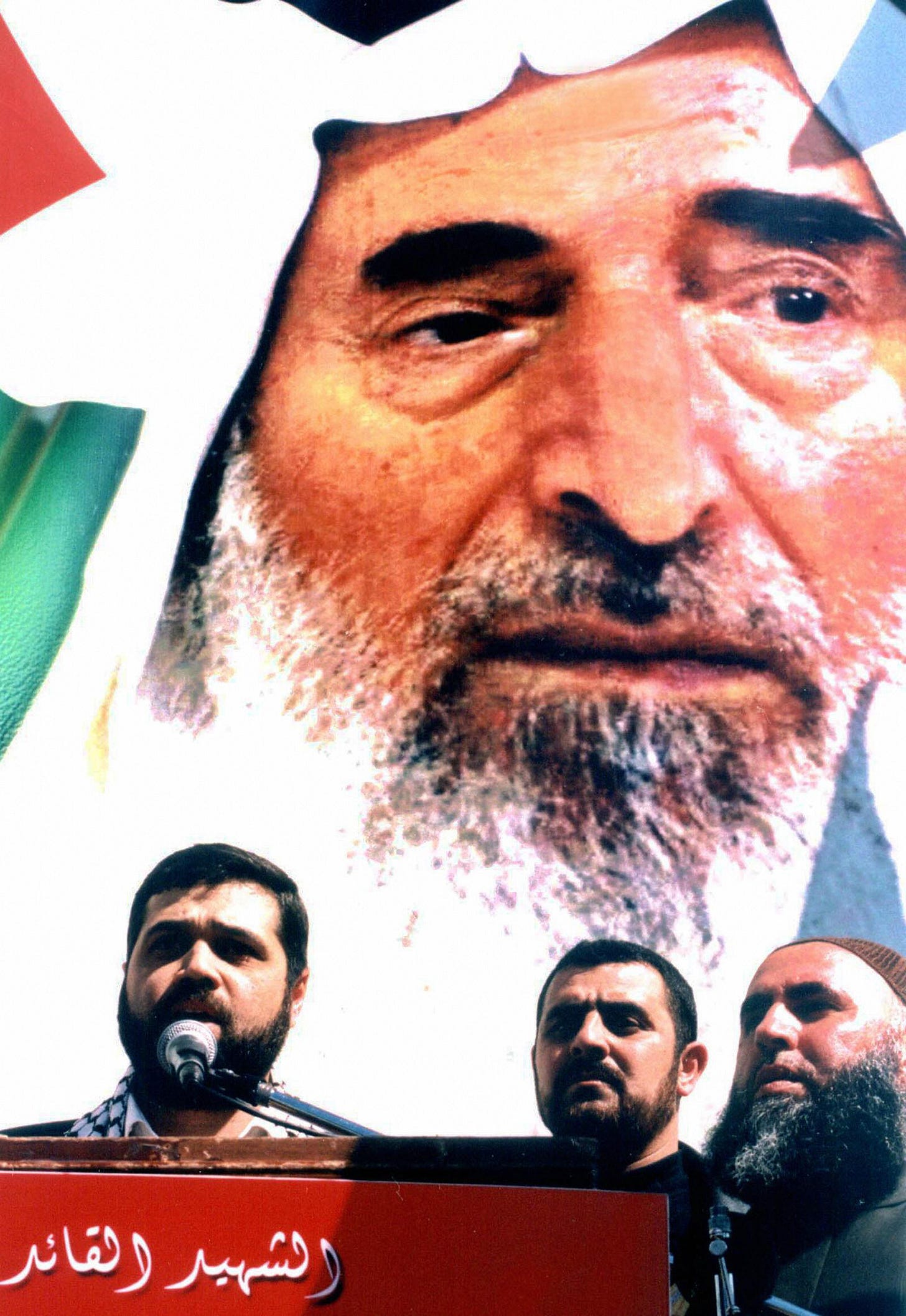
Hamas’s Direct Talks With The Trump Administration
Jeremy Scahill: On this issue of the Trump administration, do you believe that there would have been a ceasefire agreement in January if it wasn't for Donald Trump's election? Do you think this would have happened if Kamala Harris had won?
Osama Hamdan: Well, I think it helped. If Kamala Harris won the elections, I think it would be the same policy of the Biden administration policy, which supported the Israelis totally, which they considered themselves as a part, which was not considered by Hamas or the Palestinians, but they [made] themselves as a part of the war and the fight against the Palestinians.
We know that the Trump people, they have done a good job in order to make [the January ceasefire] happen. But it's not enough. We have to be honest and serious, it's not enough. When the meetings with Adam Boehler took place, there was a real possibility. This is why the Israelis were furious and they were angry.
Jeremy Scahill: Adam Boehler, just to remind people, was the US special envoy on hostages, also a close friend of Jared Kushner, the son-in-law of Donald Trump. And you and other Hamas officials met directly with Adam Boehler. You were one of the officials from Hamas to engage in the first direct talks with the United States.
Osama Hamdan: Exactly. And I think there was a good chance. In fact, we've talked about politics, not only about the prisoner exchange issue. And I believe he heard something he didn't expect to hear from Hamas, not because we were trying to say that, because we have answered a very specific questions which everyone is asking, like your questions: How can we solve the problem? So we have our specific ideas about solving the problem. And this is why the Israelis are angry and they dislike to see any Palestinians talking directly to the United States administration, especially Hamas, because you are offering a right solutions, a right ideas, a good ideas, if I want to say, to be more specific.
I think this is why we expect more from Trump’s administration, not just to keep the security of Israel, not just to listen to the Israeli side. All the world, mainly the United States administration, has to listen to the Palestinians. You have to listen to their side of the story. You can't see the issue by one eye. You have to see it by both eyes. You can't deal with the issue according to what they are saying. You have to deal with the issue according to the important basis, the international law, the international resolutions.
You have to deal with the Palestinians as a free nation who is seeking to be a real free nation. After 76 years of occupation, we still consider ourselves as a free nation and of freedom fighters. So you have to deal with those facts, as the administration of the United States, if you want to guarantee a good relation with the region, a good relation with the world, you have to solve this problem.
You can't solve it just by listening to Netanyahu who is lying to his own people, not only lying to the Americans or lying to the Arabs, he's lying [to] his own people. They understand that he's lying, and you have to deal with that. I believe this is why we know and we believe that the United States administration can do more than just a ceasefire, even if it was permanent. They can do more than this.
Jeremy Scahill: You know, what was interesting is that Adam Boehler, a number of times in interviews that he gave on U.S. media and Israeli media, he himself raised the issue that is Hamas's proposal for a hudna and talked about a multi year truce. This was quite extraordinary, to hear Adam Boehler accurately describe what was Hamas's position.
Technically he was the envoy on hostages. I know he raised the issue of Edan Alexander, a dual American-Israeli citizen who was in the IDF on October 7th, when he was taken back to Gaza and is still held captive. But Boehler seemed to engage in a much wider discussion with you than just the fate of an American held captive in Gaza. Is that right?
Osama Hamdan: Well, you can't separate the issues. He's an American citizen, but he was a soldier in the Israeli army. So when you talk about him as an American citizen, there is a direct question: Why is he allowed to be a fighter or a soldier in another army, not any other army, an army who occupies the Palestinian lands, who was killing the Palestinian people? Because you came to us and talked to us directly, we are ready to deal with that in a different way, not like the other Israeli soldiers. But you have to know that simply—if we solve it without any political solution, there will be more Americans who come to fight with the Israeli army against the Palestinians. And you will come back after a while asking us for their bodies—or for them if they were still alive—because there are four other American or Israeli soldiers who have [U.S.] citizenship, they were killed by the Israeli bombardment.
So let's go directly to the main point. You want to guarantee that no Americans will be held as prisoners because they were soldiers in the Israeli army. So, let's prevent the Israeli army from killing the Palestinians. And that opened the door for a political talk. And I respect that he has the courage to talk about this, to listen. He listened carefully. He asked questions defending the position of the administration, and he was direct when he talked. When we saw that, we were direct to him. And I think that created a kind of political ideas, which we have expressed and talked about.
I believe one of the reasons why the Israelis have assassinated some of the Palestinian leaders was because they have the chance to talk directly to the United States. They want to prevent any kind of contact between the Palestinian resistance and the United States administration because they have a narrative that those are terrorists. But when they talk to the administration, the administration discovered that they are freedom fighters and they have a political narrative and they have a political stand, and they are seeking to have a political solution. This is what the Israelis are trying to prevent, and this is what, I believe, the United States administration and the congressmen, they have to understand and they have to go to work according to that.
Jeremy Scahill: In the recent discussions that Hamas has had with the Egyptian and Qatari mediators, do you get any sense that the Americans are putting any pressure on Israel right now to make a deal with Hamas?
Osama Hamdan: Well, I have to put it in this way: We believe, until now, it's not the needed pressure.
Jeremy Scahill: You mean, it's not sufficient pressure?
Osama Hamdan: It's not a sufficient pressure. They know that they can do that. Simply they can do it. If they said, “OK, we are not providing you with the new weapons.” I think just saying that, it will show the Israelis that the administration is serious and they have to go to the ceasefire. It's not a sufficient pressure. I don't know why, but I believe they can do it. And the question why they are not doing that, it's supposed to be left for the administration.
“You want to guarantee that no Americans will be held as prisoners because they were soldiers in the Israeli army. So, let's prevent the Israeli army from killing the Palestinians.”
Jeremy Scahill: Donald Trump in just some days is going to be traveling to the region. He'll go to Saudi Arabia, he'll go to Qatar, he'll go to the Emirates. Trump has said publicly since his reelection as president, that he's certain that Saudi Arabia is going to engage in normalization with Israel. The Saudis have said that they won't do that unless there is a clear and irrevocable path to Palestinian statehood.
But the Saudis are complicated with how they deal with Trump. There's a lot of business involved with this. It seems like there is some pressure coming from the White House right now to get Israel to agree to a temporary deal while Trump is in the region. What can you tell us about that possibility?
Osama Hamdan: Well, I think a temporary ceasefire will not solve the problem. And I agree with you that the situation between the United States and Saudi Arabia is complicated. But I also understand and believe that the Saudis are still committed to the Palestinian state solution. So even if the situation is complicated, they will do their best and they will succeed in separating between the relations with the United States and the normalization with Israel. The normalization with Israel will be connected to the Palestinian independence and the relations with the United States is related to some other issues, mainly economical issues and political issues in the region.
But here is the question: Is the United States administration and President Trump seeking to have just a short term ceasefire or is he willing to have a permanent ceasefire which may lead to a political solution? If he wants a short term ceasefire, that will turn the things to be more complicated by the time, and it will affect all the things in the region, not only the Palestinian-Israeli conflict. And I know he has more plans than the region. So he has to make the choice, whether to make the Israelis accept the long term ceasefire and to go to the political solution which leads to a Palestinian independent, sovereign state. Otherwise to have a short time ceasefire and facing more problems in the region.
I assure anyone that the Arab countries will not go to a normal normalization without having a real Palestinian, independent, sovereign state. So he has to make his choice whether to have a short term ceasefire, knowing that will create more problems, or to have a permanent ceasefire leading to a political solution and maybe more solutions for the problems in the region
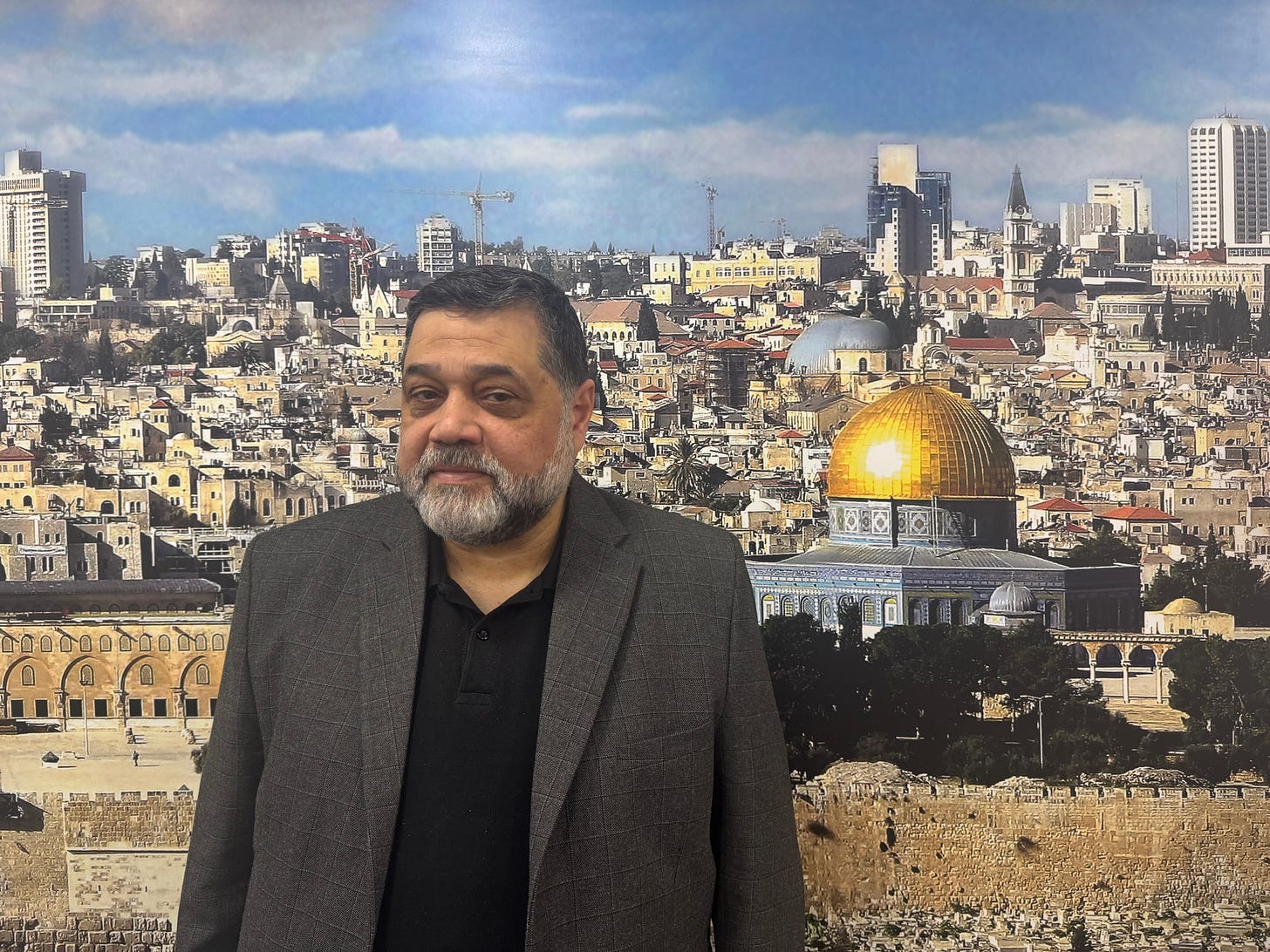
Why Hamas Will Not Disarm
Jeremy Scahill: There have been some suggestions in the media, including those based on comments from officials of Hamas, that the Hamas movement was surprised to hear Egypt present a proposal that included disarmament of Hamas. Has Egypt been putting pressure on Hamas increasingly to make a deal and to make more concessions?
Osama Hamdan: Well, as mediators they have to insist, but they can't force Hamas to accept. Why were we astonished to see them talking about this issue? Because it's an Israeli issue, and as a mediator you are not supposed just to admit any suggestion from the Israeli side. You have to deal with that. You have to talk directly to the Israelis [and say], “This will not work.”
If Hamas said we want Netanyahu to hand [over] power and to give up Tel Aviv for the Palestinians, for example, they will directly answer, “This will not happen.” Why not talking to the Israelis in the same way? “This will not happen.” So we are astonished by that, although they've said we are not admitting that as a suggestion from our side, but it was the Israeli idea. But this idea is not accepted. Even it will not be discussed inside Hamas leadership.
Jeremy Scahill: So you can guarantee Hamas will not agree to disarmament?
Osama Hamdan: No, no one. No one will agree.
Jeremy Scahill: Under any circumstance?
Osama Hamdan: No one will agree or accept that.
Jeremy Scahill: And Hamas will not agree anymore to a short term truce unless it leads to a path that has a clearly defined way of getting a permanent ceasefire and a full withdrawal of Israel. Is that true also?
Osama Hamdan: That's true also.
Jeremy Scahill: So no short term agreement, unless it has a…
Osama Hamdan: No need for a short term ceasefire, because simply when you say, “short term ceasefire,” it means: “and we are coming back to kill you.” Why accept that you are killing us? Why just postpone that for two or three weeks?
Jeremy Scahill: You recently said on Al Jazeera Mubashar, you rejected the question that was asked to you when the phrase “the day after” was used about Gaza.
Osama Hamdan: Exactly.
Jeremy Scahill: And you said that this is an Israeli framing of it, and that the question should be what comes after the aggression and the genocide ends. What is your vision for what should happen when the genocide is halted?
Osama Hamdan: Well, when genocide is halted, the Palestinians have to decide how to continue their work and efforts to gain their rights, without giving up the resistance. The Israelis, they have used this “the day after” term in order to convince everyone that what will happen in Gaza [is] that they will take over the situation within a few weeks and they will get rid of the resistance and there will be an issue of some people who are living on the land of Gaza, how to solve their problem. Not even as a nation, as just humans. This is why we have said there is no day after. There is a day after the genocide [is] stopped. And this day is supposed to be a Palestinian day, a Palestinian national day, because we have stopped the genocide and we have to decide by ourselves as Palestinians what we are supposed to do.
Mainly, I expect that the Palestinians will say, “Let's go to the main way to elect our own leadership.” There is a leadership who has resisted. There is some leaders, who are staying in Ramallah, who have done nothing. What is your choice as Palestinians? And according to that choice, we have to move forward. I guarantee, I can say it with full confidence, that the Palestinian nation will not give up the resistance unless there is a liberation of their lands. So in order to shorten all the way, give the Palestinian people their rights.
I believe the day after the genocide is stopped, the Palestinian people also will focus on this genocide and we will talk to the whole international community. Those people who committed this genocide is supposed to be questioned and to be judged according to the laws, how they committed this genocide. Like what had happened with the people who committed the Holocaust. Because it's the same issue. It's the same thing: killing the people for their beliefs, for their ID, killing the civilians. They are not fighting. They are concentrating on the civilians.
When you talk about around 52,000 Palestinians who were killed, 16,000 out of them, they are children, 12,000 out of them, they are women. You are talking about even the men, the minority of them, they are fighters, most of them, they were civilians. 50% of them, they were old men. So you are talking about 80% of the Palestinians who were being killed totally. They can't even do anything against the occupation. Not only civilians, they are not capable to do anything against the occupation. So they are targeting the civilians, and they are doing that on purpose, not as something by [mistake]. They are doing that because they believe, as they have expressed, they believe that this will affect the resistance of the Palestinians.
And they've used words, I don't know what if that was said by the Palestinians. “You have to kill even the children because they will be fighters in the future. You have to kill the women because they are pregnant and they will deliver fighters.” What if some Palestinians have said that against the Israelis, for example, how will it be received? I think the Palestinians will follow up this issue, all the Palestinians: the people who have lost their brothers, sisters, sons, daughters, fathers and mothers. They will raise this big question for the international community: “Those who committed this genocide, what you are going to do with them?” You have to question them. You have to judge them because of what they have done.
“There is a day after the genocide [is] stopped. And this day is supposed to be a Palestinian day, a Palestinian national day, because we have stopped the genocide and we have to decide by ourselves as Palestinians what we are supposed to do.”
If they have immunity, it means that others can do the same thing in several places in the world. What if that happened? Some other superpowers, growing superpowers in the world, have given this right to small countries supported by those superpowers. I think we will turn the world to a kind of, not a jungle, maybe worse than a jungle, because even in the jungle, the animals, they kill to eat but they don't kill more than this. But when you commit a genocide, it's really a disaster which cannot be explained by words or by saying, “Sorry, I have done this and I will not do it again.”
The Legacy of Operation Al Aqsa Flood and October 7
Jeremy Scahill: How do you think history should remember Yahya Sinwar, the political leader in Gaza of Hamas, who was killed in a combat operation actually. He wasn't killed in a tunnel, he wasn't hiding somewhere. In fact, he was killed as he was engaged in battle against Israeli forces and it was caught on video. Muhammad Deif, the commander of the Qassam Brigades, who is widely believed to have been one of the most important figures in modernizing the Qassam Brigades into a professional fighting force.
How should history remember Yahya Sinwar and Muhammad Deif?
Osama Hamdan: I think now, in the Palestinian history, they picked the highest position as fighters and the leaders who sacrificed themselves for the cause of their people. But I think that history will write that those people, regardless of all the problems facing the Palestinians, they have a clear mind and they were focusing on the main goal of the Palestinian nation, the independence of the Palestinians, the liberation of the land of the Palestinians, the liberation of the people. They did not talk anytime about Hamas as a movement or themselves as the leaders of Hamas. They've kept talking about the Palestinian nation, the Palestinian people who were oppressed by the occupation.
They will be remembered in the history as a people who sacrificed themselves while they were fighting for their cause as Palestinians, who challenged the power of the most powerful occupation and the most powerful army in the region. They did not accept to live just like cattle. They decided to live as a free people, even if that led them to sacrifice themselves. They will be remembered as a people who were courageous enough to fight in the front lines. They did not hide themselves in the tunnels or behind their soldiers. They were in the front lines.
Yahya Sinwar, when he was elected as the head of the Political Bureau after the assassination of brother Ismail Haniyeh, everyone knows it's a matter of time each day, before even the assassination, each day from the 7th of October, we've expected to hear that he was killed in combat, because we know that he's not the kind of a man that he can hide while the fight is going on. He was each time in the front line.
This is why he was respected by his soldiers, generals in Al Qassam Brigades. By his own people, he was respected. After the war, you will hear from normal people that they have saw Yahya here or there, before he’s been assassinated. We were relieved when he was “Shahid” (Martyr in Arabic) in a direct combat with the Israelis, not because he was killed, but because he shows the most courageous leadership that can be from a Palestinian leader.
Jeremy Scahill: How do you believe history should view Operation Al Aqsa flood, the October 7th operations of Hamas?
Osama Hamdan: I believe it will be a significant turning point in the Palestinian history, which I believe it's the start of the real liberation of Palestine. It will take a while, but I think the consequences of Al Aqsa flood will lead to the real liberation for the Palestinians.
Mahmoud Abbas, the Palestinian Authority and Israel’s War Against the West Bank
Jeremy Scahill: Mahmoud Abbas recently called Hamas “sons of dogs.” In fact, in English, it could even be a worse translation but I'll leave it at “sons of dogs.” “Hamas should hand over its weapons and release the Israeli captives.” He was very clearly portraying Hamas as the obstacle to a settlement and as being responsible for the genocide. What's your response to Mahmoud Abbas?
Osama Hamdan: Well unfortunately, he didn't see what is happening as a genocide. He didn't have any comment against the genocide. He, even in the last 18 months, didn't mention the Israelis as an army committing a genocide against the Palestinians. And suddenly he starts talking about the Palestinian resistance.
I believe he lost his credibility as a Palestinian leader and he is not anymore respected by the Palestinians. And the history, I don't know how he will be mentioned in the history. He was the tool which was used against Yasser Arafat, but he will not be an effective tool against the resistance. He's just destroying his reputation and his image. I don't know how his sons and grandsons will walk among the Palestinian people after his death.
Jeremy Scahill: You know, we talk a lot about Gaza for obvious reasons because of the genocide, but the situation in the West Bank is really horrifying and getting worse every day. And you've had the Palestinian Authority collaborating with the Israeli forces. But it really does seem like Netanyahu is intent on illegally annexing as much of the West Bank as he can, as quickly as he can. How does that relate to the genocide in Gaza? And what do you see happening then in the West Bank?
Osama Hamdan: Well, I think the problem in the West Bank is the Palestinian Authority and the collaboration with the Israelis, it makes it more easy for the Israelis. Talking about Jenin camp, for example, it was under the Palestinian siege for 40 days. They were searching for the weapons, for the militants. In fact, they opened the roads, they got rid of the ambushes by the resistance and then they allowed the Israelis to invade the camp. What was the outcome? More than 3,000 houses were destroyed or demolished by the Israelis in the camp. We are talking about 50,000 Palestinians from Jenin who were deported from their houses and they are not allowed to go back. The same issue is happening in Tulkarm and in Nablus. And no one in the Palestinian Authority is trying to say “enough is enough.” They don't want to resist. It's really a killing mistake for their cause. But at least they have to start talking.
I think the Israelis, their main goal is to take over all the West Bank. They consider now Area C, which is 62% out of West Bank, as part of Israel. They are willing to talk also to have B area. And they are trying to push all the Palestinian nation to go, either to leave to Jordan or to be in the closed areas behind the walls in the main cities. And this will be just the cities for those people who have to be controlled by the security forces. I think in their mentality, the Israeli government, they have no space for the Palestinian Authority as a united authority. They will divide it as security guards for those people who are supposed to live as slaves in those areas, just workers for the Israeli benefit.
So this is what's happening. This is the plan for the West Bank. And I believe they will be mistaken if they felt for a while that the Palestinian Authority will keep controlling the situation. The people will resist that and they will turn against that. Even if the Palestinian Authority tries to be a handler, they will not accept that anymore. This is why I think the Israelis insisted to see Hussein Al-Sheikh as a deputy for Abu Mazen, because they know that he is willing by himself to handle this dirty job on their own behalf.
Jeremy Scahill: One very incisive Palestinian friend of mine said that this wasn't Abbas's choice, this was Israel's choice.
Osama Hamdan: Exactly. It was Israel's choice. Everyone knows that.
Jeremy Scahill: He's deeply involved also in security operations.
Osama Hamdan: More than this, in fact. More than this. In fact, if you heard him talking in a closed room, you'd feel that you are talking to an Israeli soldier. That is not my words. It's the words of some significant leaders of Fatah.
Jeremy Scahill: You're saying that some Fatah leaders, this is the party of Mahmoud Abbas, have described the man that was just named as his Vice President…
Osama Hamdan: They've talked in public now. That it's the choice of Israel, not the choice of Mahmoud Abbas.
The Impact of the Assassination of Hassan Nasrallah and the Overthrow of Bashar Assad in Syria
Jeremy Scahill: How was the assassination of Hezbollah Secretary General Hassan Nasrallah and the attacks against the leadership of Hezbollah in Lebanon, clearly devastated many of their capabilities and their leadership, how will that affect the region and the Palestinian cause?
Osama Hamdan: You know, I think Hassan Nasrallah was not only—he was the Secretary General of Hezbollah, but he was not only the leader of Hezbollah. He was one of the significant leaders in the region, who believed in the unity of the region, not being part of the problems, although Hezbollah was involved in the Syrian issue. But his beliefs about the unity were very clear. He supported the Palestinian cause, although he can do like many of others: I can have some press release, maybe send some aid for you. But he made the decision, even without talking to us, to support the Palestinians and to be part of this struggle, even though he knows it may cost, not Hezbollah, but himself, his life.
Jeremy Scahill: You're talking about when he made the decision to open the solidarity front after October 7th.
Osama Hamdan: Exactly. There was a meeting with Sayed Hassan Nasrallah the second day, evening of the 8th of October.
Jeremy Scahill: 2023.
Osama Hamdan: Exactly. They have started, early morning, launching the rockets against the Israeli presence in Sheba’a. And he said, “we are going forward and supporting you, and that was our decision.” And the question was: “What if there was consequences?” And he said, “We will deal with the consequences, but we will not pull back from this fight.”
I think he shows how the solidarity can be with the Palestinians. He sacrifices himself. Last time we met him, a few weeks before the assassination, he was confident that what is happening will lead for the end of the Israeli occupation. It may take more longer than we expect, but it will lead for that.
Jeremy Scahill: You're saying that Sayed Hassan Nasrallah was predicting that this would be the beginning of the end of Israel’s occupation.
Osama Hamdan: Exactly. Although in this meeting he talked about “shahada” (Martyrdom in Arabic) more than he used to be.
Jeremy Scahill: About shahada, about martyrdom.
Osama Hamdan: Yes.
Jeremy Scahill: Same question, but about Bashar al-Assad in Syria, his overthrow, how does that impact the region and Palestine?
Osama Hamdan: Well, I think if you want to talk about the Syrian people and the Syrian political parties, they also have the same problem with Israel. Their land is occupied, Golan Heights. The Israelis have added now Jabal Al-Shaykh (Mount Hermon) and more than 400 square kilometers occupied.
Jeremy Scahill: Also, Israel bombed almost the entirety of the conventional military capabilities of Syria.
Osama Hamdan: Exactly, and that happened without any comment from the international community. So they have, as Syrians, they have their own struggle with the Israelis and most of the Syrians, they supported the Palestinian cause and they were part of that. If you want to start from Sheikh Izz ad-Din al-Qassam, who came from Syria, from Jableh and going forward through the history. So I believe Syria is in a position, even if some people are talking about peace between Syria and Israel, are Israelis ready to withdraw from the Syrian lands or they want the peace on the behalf of the Syrian people and the Syrian lands?
So, I think, the Israeli attack against Syria is creating more problems between Israel and the Syrians. And I don't think that the change in Syria will be useful for the Israelis because their mentality is to move forward occupying more lands. And this is one of the problems which the United States administration has to handle. When you talk about the occupation for the Palestinian lands, you are not talking about just an occupation in the Palestinian lands. You are talking about the occupation who is occupying part of the Lebanese lands, who is occupying part of the Syrian lands, who is talking about enlarging the country or the occupied places, like what has Smotrich said when he was asked about the relation with Jordan and he said, “Well, I believe the borders of Jerusalem is up to the gates of Damascus.” And when they try to correct him, “You believe that the borders of Israel?” And he said, “no, no, I believe the borders of Jerusalem is up to the gates of Damascus.”
If that mentality is leading Israel, so we have to expect more complications, more attacks, not against the Syrians and the Lebanese, Palestinians, also even against the Jordanians themselves. So I expect now we have to talk about one of two scenarios. Either the Israelis keep the occupation for the Syrian lands and that will bring the Syrians to resist the occupation, or the Israelis will push for a kind of disturbance, instability in Syria, in order to keep the lands. And this instability will create more options for the Syrians to resist their occupation because they seek to have their stable, independent state. So why to accept the Israelis attacks and disturbance of the country and creating more problems? The Israelis believe they can have the full control on the situation of the region, but I believe they are less than this.
Hamas and the “Two State Solution”
Jeremy Scahill: Hamas has said officially that it would not oppose what's often called a “two state solution.” If it was the will of the Palestinian people, Hamas would not stand in the way of it and would respect it, but it would have to specifically be along the lines of the pre-67 war and with Jerusalem as the capital. Given the political situation now and what's happened over the past 18 months, is there any point to even discussing this anymore? Is this even a possibility in your assessment?
Osama Hamdan: Well, I think the Israelis have shown that they are not willing to have even the two state solution, and they are talking about what they have called the final solution to get rid of the Palestinians. According to those circumstances, everyone expects this will not happen. But I think if there was a real understanding that the soil, the main soil, of Al Aqsa flood on the 7th of October, if there was a complete understanding for that, the international community would work hard to have a Palestinian state on the lines of the 4th of June 67.
Because the main message of this action was the Palestinians will not give up their lands and they will do the impossible to achieve that goal. And the impossible have been done on the 7th of October. No one expected that Gaza brigade, which is the most powerful part of the Israeli army, can be defeated in a few hours. No one expected that those people who have very simple arms, Kalashnikovs, RPG, nothing more than this can defeat an army with the Super Tanks Merkava 4, with the, if I want to say, the most powerful air fleet. No one expected that—a complete failure for the Israeli intelligence.
This impossible, which took place, it shows that the will of the Palestinians to be liberated is still reserved after 70 years of occupation and it will be until the Palestinians can get rid of the occupation. If the international community understands that soil of this operation, I think their main job now is to make the Palestinian state a fact. And if that happened, I think it will be an important turn, not in the Palestinian history, but I think in international history, because it will express a kind of balanced justice in the world. Otherwise, I think it will be a sign of the end of this international order and who knows what that will lead to
Jeremy Scahill: So you think that there is a possibility of reaching such an arrangement, along pre 67 borders with Jerusalem as a capital?
“Because the main message of this action was the Palestinians will not give up their lands and they will do the impossible to achieve that goal.”
Osama Hamdan: I still think that there is a real possibility for that, if the international community wants to keep the order. Otherwise, I think we will face a complete failure for the international order and this will lead to more complicated consequences, not [only] on the Palestinian situation, but all over the world.
Jeremy Scahill: I have to ask then about the stance that Arab nations, Gulf States and other Arab nations have taken during this 18 months. I've heard you've been very, very critical of them. I mean, their role in all of this has largely been to stand by silently as the Palestinians have been slaughtered.
Osama Hamdan: I agree with that, but at the same time there is a growing anger among the nations and no one can expect when that can explode and if it exploded, how this will happen. I assure you that will change the face of the region.
Jeremy Scahill: Are you talking about the populations in those countries of ordinary people, or do you mean the rulers?
Osama Hamdan: I'm talking about the populations and some of the rulers of those countries also.
Jeremy Scahill: Interesting. Doctor Osama Hamdan, thank you so much for your time.
Osama Hamdan: Thank you for having me this time. You are welcome.
Drop Site News Middle East Research Fellow Jawa Ahmad contributed to this story.




